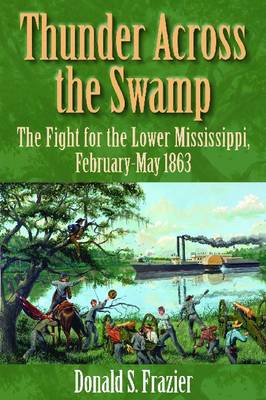Confederate President Jefferson Davis hoped one of his commanders could baffle the enemy in his designs on the Mississippi Valley. Confederate Major General Richard Taylor knew that the only long- term solution to protecting the twin river citadels at Vicksburg and Port Hudson was an active offensive. To that end he had already built a modest but well-supplied army while his powerful Rebel gunboat flotilla grew daily. Taylor just needed time. With the enemy army under General Nathaniel P. Banks fixated east of the Mississippi, Taylor believed he might just see his plans put into action With luck, the Confederate army might regain territory lost in Louisiana and its flag might once against float over New Orleans. The Union army would then have much larger issues to worry about.
Taylor had cause to be optimistic. The Federal Army and navy had been trying the direct approach against Vicksburg and Port Hudson with mounting casualties, lost ships, and growing frustration. "There is no use longer deceiving the public, for the Banks expedition is a failure," wrote a Massachusetts journalist. "Much as I admire Gen. Banks I am forced to admit that he is not the soldier I judged him to be nor the general this department needs."As Rebel plans matured, time grew short for Union efforts. Banks needed to redeem himself, and his officers suggested an indirect approach west of the Mississippi, working from enclaves captured the previous fall, as the the key to victory. "The Teche county was to the war in Louisiana what the Shenandoah Valley was to the war in Virginia" Captain John William De Forest of the 12th Connecticut Infantry noted. "It was sort of a back alley, parallel to the main street wherein the heavy fighting must go on". Instead of wasting his army against enemy entrenchments and prepared positions, Banks decided instead to roll up Bayou Teche, destroy Taylor's small army, and isolate Port Hudson from its groceries. Capturing places like Franklin, New Iberia, Opelousas, and Alexandria, he might even open the possibility of cooperation with the army under General Ulysses S. Grant operating against Vicksburg.
Taylor, caught by surprise and beaten to the punch, reacted with typical pugnacity "To retreat without fighting was . . . to abandon Louisiana", he wrote. Unless his army held its ground, the way across the Pelican State lay open to Union invasion with potentially catastrophic results for the fight for the lower Mississippi River. If Union land and naval forces gained control of the Red River, they would shut off the steady supply of corn, hogs, and beef heading into the forts across the river.In the spring of 1863, the opening act of the final scene of the Mississippi Valley campaign would play out in southwestern Louisiana among the bayous and swamps of the massive Atchafalaya Basin.
Donald S. Frazier, author of the award-winning Fire in the Cane Field, expands up his Louisiana Quadrille with the release of book two, Thunder Across the Swamp: The Fight for the Lower Mississippi, February-May 1863. The better known stories of the campaigns for Vicksburg and Port Hudson grow richer and more nuanced by taking a look at the fighting west of the river as part of a larger picture.
- ISBN13 9781933337449
- Publish Date 28 September 2011
- Publish Status Active
- Publish Country US
- Imprint State House Press
- Format Hardcover
- Pages 368
- Language English
